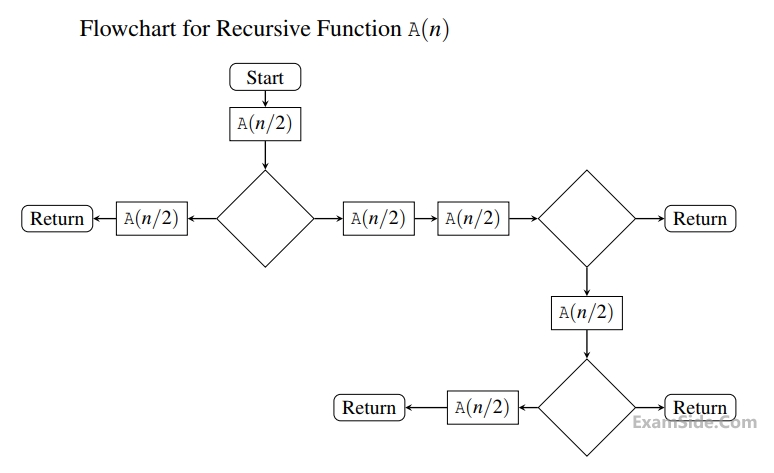1
GATE CSE 2021 Set 1
MCQ (Single Correct Answer)
+2
-0.67
Consider the following recurrence relation.
$$T(n) = \left\{ {\begin{array}{*{20}{c}} {T(n/2) + T(2n/5) + 7n \ \ \ if\ n > 0}\\ {1\ \ \ \ \ \ \ if\ n = 0} \end{array}} \right.$$
Which one of the following option is correct?
2
GATE CSE 2019
MCQ (Single Correct Answer)
+2
-0.67
There are n unsorted arrays : A1, A2, …, An. Assume that n is odd. Each of A1, A2, …, An contains n distinct elements. There are no common elements between any two arrays. The worst-case time complexity of computing the median of the medians of A1, A2, …, An is :
3
GATE CSE 2016 Set 2
Numerical
+2
-0
The given diagram shows the flowchart for a recursive function $$A(n).$$ Assume that all statements, except for the recursive calls, have $$O(1)$$ time complexity. If the worst case time complexity of this function is $$O\left( {{n^\alpha }} \right),$$ then the least possible value (accurate up to two decimal positions) of $$\alpha $$ is ____________ .


Your input ____
4
GATE CSE 2015 Set 3
MCQ (Single Correct Answer)
+2
-0.6
Let $$f\left( n \right) = n$$ and $$g\left( n \right) = {n^{\left( {1 + \sin \,\,n} \right)}},$$ where $$n$$ is a positive integer. Which of the following statements is/are correct?
$$\eqalign{ & \,\,\,\,\,\,\,{\rm I}.\,\,\,\,\,\,\,f\left( n \right) = O\left( {g\left( n \right)} \right) \cr & \,\,\,\,\,{\rm I}{\rm I}.\,\,\,\,\,\,\,f\left( n \right) = \Omega \left( {g\left( n \right)} \right) \cr} $$
Questions Asked from Complexity Analysis and Asymptotic Notations (Marks 2)
Number in Brackets after Paper Indicates No. of Questions
GATE CSE 2024 Set 1 (1)
GATE CSE 2023 (1)
GATE CSE 2022 (1)
GATE CSE 2021 Set 2 (1)
GATE CSE 2021 Set 1 (1)
GATE CSE 2019 (1)
GATE CSE 2016 Set 2 (1)
GATE CSE 2015 Set 3 (1)
GATE CSE 2015 Set 1 (2)
GATE CSE 2013 (1)
GATE CSE 2011 (1)
GATE CSE 2008 (5)
GATE CSE 2007 (3)
GATE CSE 2005 (3)
GATE CSE 2004 (4)
GATE CSE 2003 (1)
GATE CSE 2002 (2)
GATE CSE 2000 (1)
GATE CSE 1994 (1)
GATE CSE 1993 (1)
GATE CSE 1990 (1)
GATE CSE 1987 (2)
GATE CSE Subjects
Theory of Computation
Operating Systems
Algorithms
Database Management System
Data Structures
Computer Networks
Software Engineering
Compiler Design
Web Technologies
General Aptitude
Discrete Mathematics
Programming Languages